HVAC Companies Shanklin
Top 10 HVAC Services in Shanklin
Get multiple Air Conditioning Services quotes for your project today! Compare profiles, reviews, accreditations, portfolio, etc... and choose the best service.
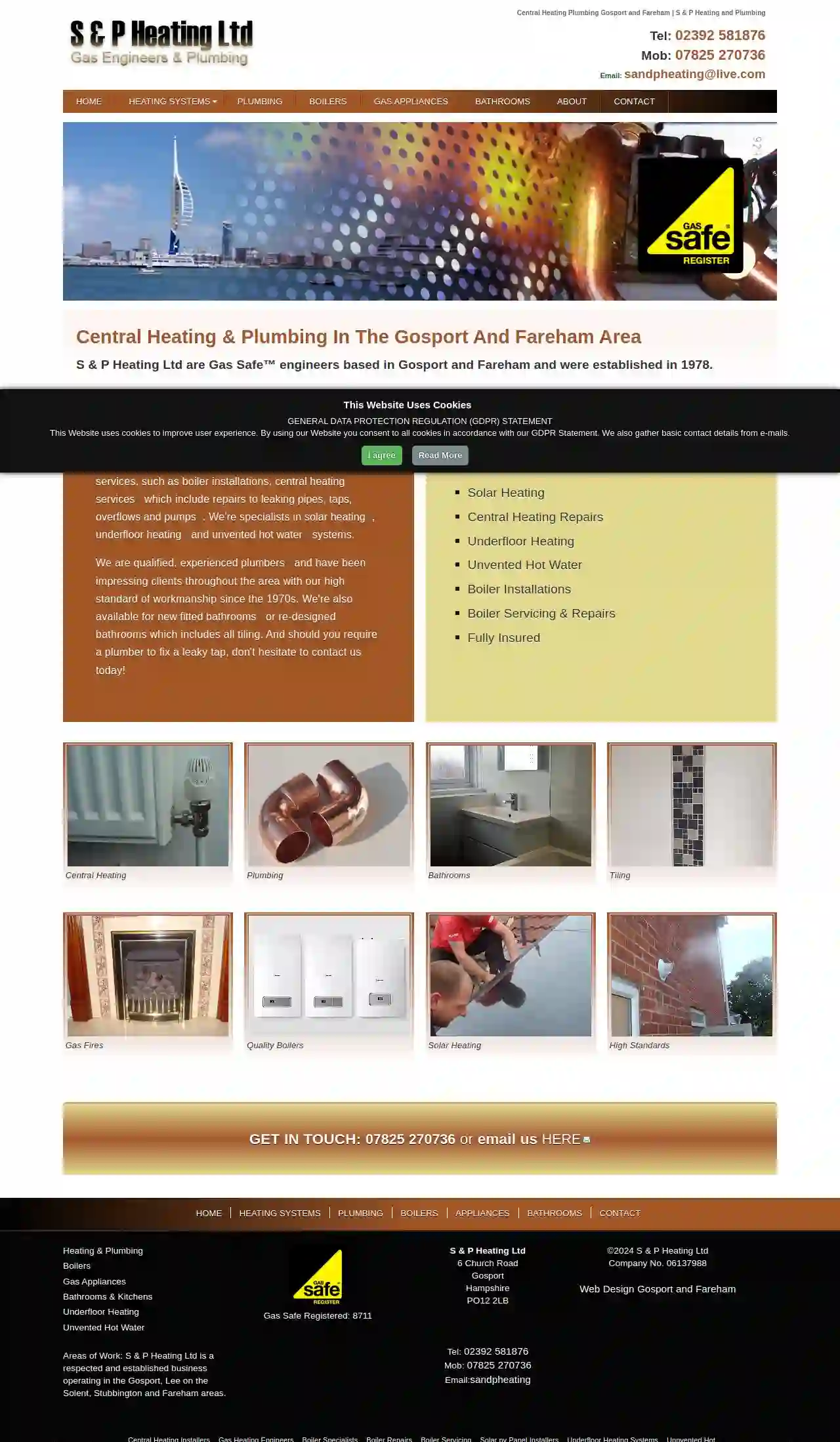
S & P Heating Ltd
6 Church Road, Gosport, PO12 2LB, GBS & P Heating Ltd are Gas Safe™ engineers based in Gosport and Fareham and were established in 1978. S & P Heating Ltd is a Gosport and Fareham based plumbing and heating company, which offers gas services, such as boiler installations, central heating services which include repairs to leaking pipes, taps, overflows and pumps. We're specialists in solar heating, underfloor heating and unvented hot water systems. We are qualified, experienced plumbers and have been impressing clients throughout the area with our high standard of workmanship since the 1970s. We're also available for new fitted bathrooms or re-designed bathrooms which includes all tiling. And should you require a plumber to fix a leaky tap, don't hesitate to contact us today!
- Services
- Why Us?
- Accreditations
- Gallery
Get Quote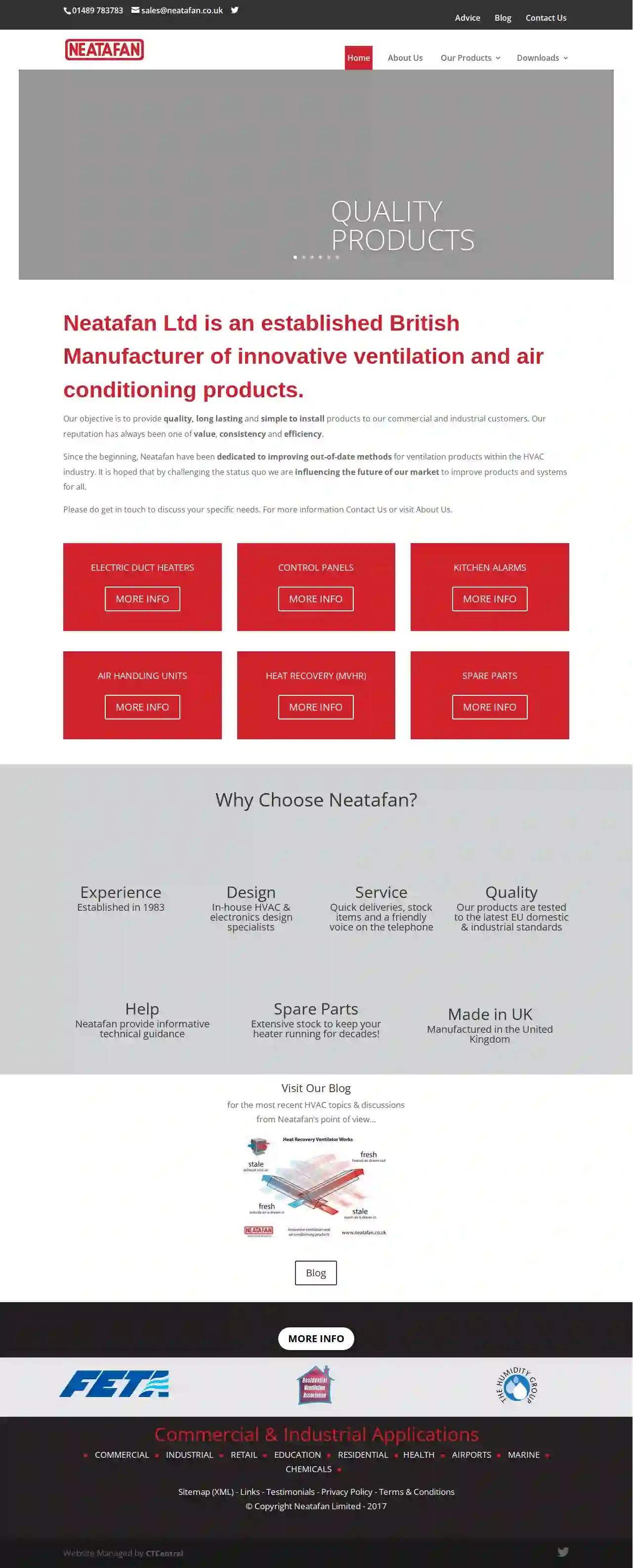
Neatafan Ltd
52 reviewsSouthampton, GBNeatafan Ltd is an established British Manufacturer of innovative ventilation and air conditioning products. Our objective is to provide quality, long lasting and simple to install products to our commercial and industrial customers. Our reputation has always been one of value, consistency and efficiency. Since the beginning, Neatafan have been dedicated to improving out-of-date methods for ventilation products within the HVAC industry. It is hoped that by challenging the status quo we are influencing the future of our market to improve products and systems for all. Please do get in touch to discuss your specific needs. For more information Contact Us or visit About Us.
- Services
- Why Us?
- Gallery
Get Quote
Airmax Installations
54 reviewsRolleston, Christchurch, New Zealand, GBAirmax is a local business based in Rolleston, Christchurch that specializes in providing Heat Pump and Ventilation servicing and installations. We pride ourselves on our premium service and friendly team. Based in Rolleston, Christchurch, Airmax offers premium services with a friendly team. We offer the most affordable rates in town and will beat any quote. Same day and next day services is available. Contact us today to get a free quote!
- Services
- Why Us?
- Testimonials
- Gallery
Get Quote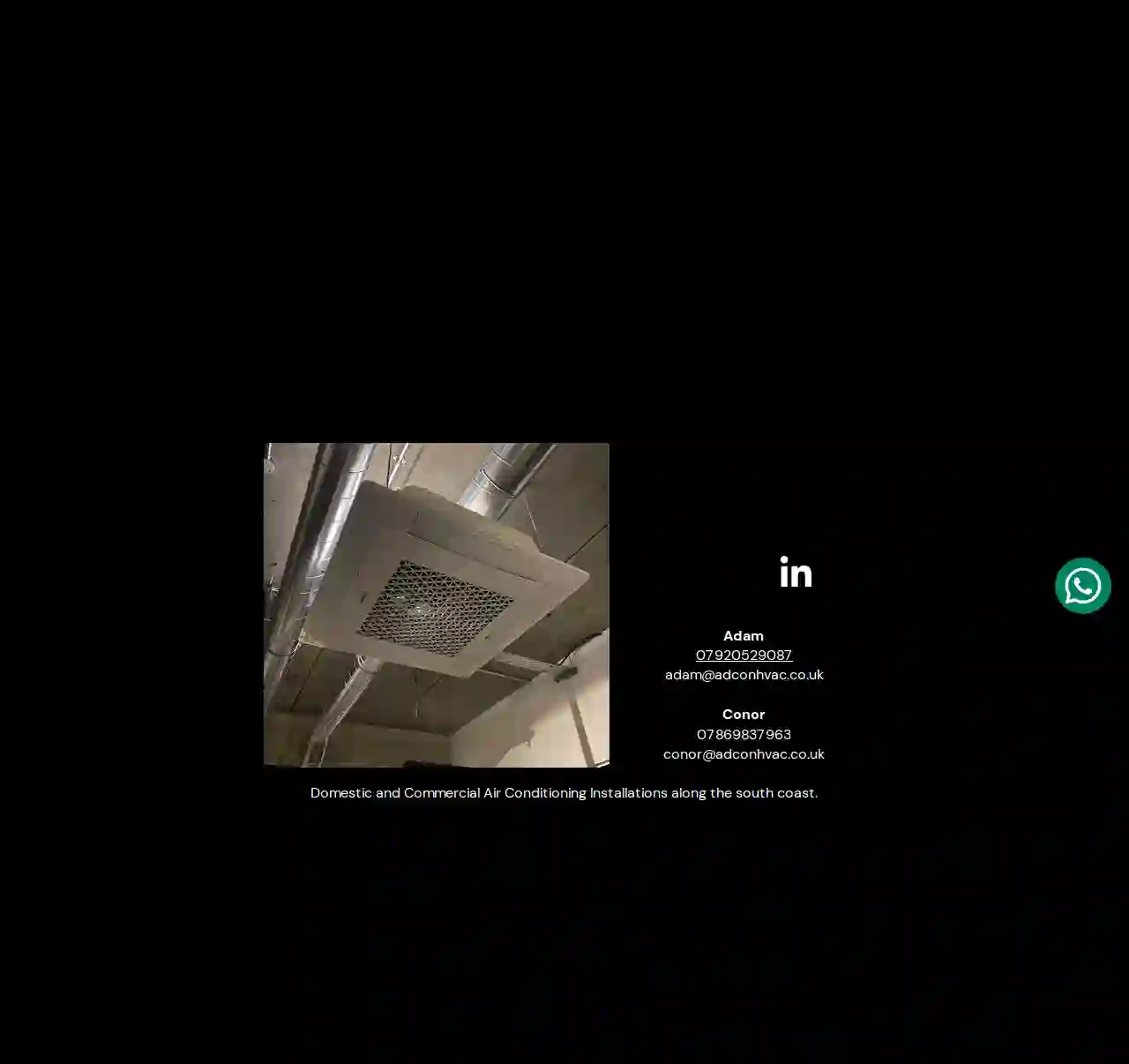
ADCONhvac
Portsmouth, GBADCON Air Conditioning is a company that specializes in domestic and commercial air conditioning installations along the south coast. With a team of experienced professionals, we provide top-notch services to ensure your comfort and satisfaction.
- Services
- Why Us?
- Our Team
- Gallery
Get Quote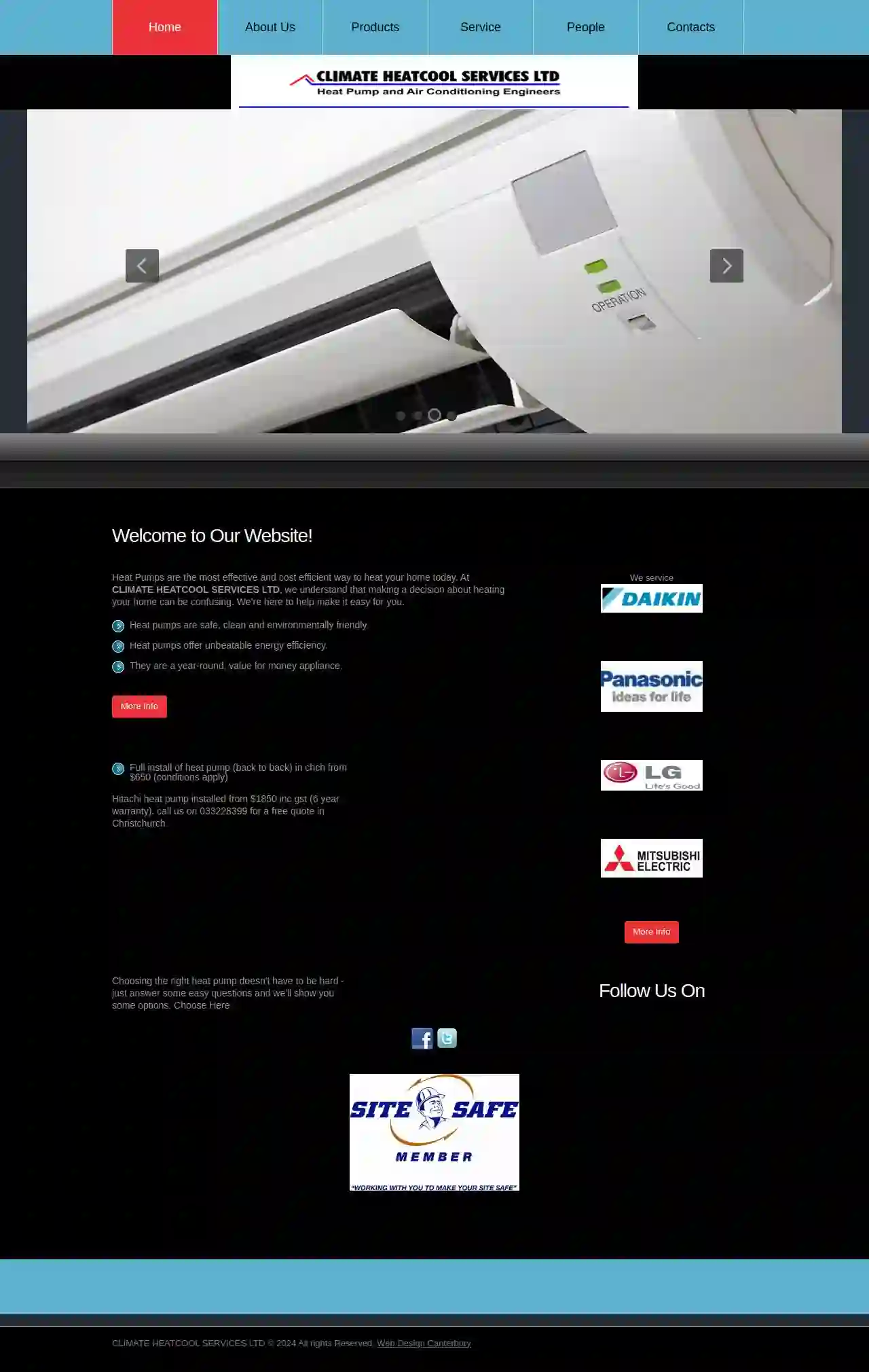
Climate Heatcool Services Ltd
53 reviewsChristchurch, GBWelcome to Climate HeatCool Services Ltd, your premier provider of heat pump solutions in Christchurch. We understand that making a decision about heating your home can be confusing, but we're here to help make it easy for you. Our heat pumps are safe, clean, and environmentally friendly, offering unbeatable energy efficiency and value for money. With a range of options available, we'll help you choose the right heat pump for your needs. Our team of experts is dedicated to providing exceptional service and maintenance, ensuring your system runs smoothly and efficiently. Contact us today to learn more about our services and how we can help you stay warm and cozy all year round.
- Services
- Why Us?
- Gallery
Get Quote
Afterglow Heating Ltd
576 reviewsChichester Close, Hedge End, SO30 2GQ, GBAfterglow Heating and Plumbing is a local, family-run business serving Southampton and surrounding areas. We offer a comprehensive range of services, including boiler servicing, repairs, and installations, gas fire servicing, and plumbing repairs. With years of experience in the gas and heating industry, Steve Hunt, the owner and operator, provides cost-effective and reliable solutions for all your heating and plumbing needs. We pride ourselves on our friendly, professional service and commitment to customer satisfaction. Whether you're a homeowner or a landlord, Afterglow Heating is your trusted partner for all your heating and plumbing requirements.
- Services
- Why Us?
- Accreditations
- Our Team
- Testimonials
- Gallery
Get Quote
Andrews Sykes Hire Ltd.
4.97 reviewsPortsmouth, GBAndrews Sykes is a global company with extraordinary expertise in providing bespoke HVAC and pumping solutions nationwide, 24/7. With a unique 165-year history, they have been moving the pump hire industry forward since the 19th century and continue to lead the way today. They offer the UK’s widest fleet of electric, gas and oil-fired boilers, designed for every conceivable heating and hot water application. Andrews Sykes also boasts chiller expertise spanning six decades, providing customized cooling solutions on any scale, from compact to high-capacity.
- Services
- Why Us?
- Gallery
Get Quote
WR HVACR
Portsmouth, GBWorth over £1.2bn, the UK heating, ventilation, air conditioning & refrigeration sector is growing fast, and needs a steady supply of skilled professionals. We have specialist expertise in all aspects of HVACR, assisting small enterprises all the way to large blue-chip corporations. HEATINGWherever you work in HVAC, we’ve got you covered. View JobsM&EWR HVAC is a wide ranging industry sector View JobsAC & VENTILATIONWe’ve broken down our expert team into subdivisions View JobsSUPPLIESHeating, M&E, AC & Ventilation, Supplies, Refrigeration & Other. View JobsREFRIGERATIONWhether you’re a job seeker or employer, contact our dedicated team today. View JobsHVAC OTHERTo hear how we can help you, call us on 0330 333 5074. View Jobs ABOUT WR HVAC. WR HVAC are specialist recruiters providing innovative recruitment solutions to the HVAC and M&E sectors. We are proud to work with leading manufacturers and M&E contractors sourcing the best talent from graduate level through to senior appointments covering permanent and contract recruitment. We are at our best working with SME’s on crucial or senior appointments. Typical positions we recruit: Head of Departments Sales Managers Ops Managers Project Managers Site Managers Estimators Service Managers Quantity Surveyors Team Leaders Temp Labour Electrical Improvers Welders Mechanical Fitters Plumbers Pipefitters General Operatives Electrical Mates View Jobs
- Services
- Why Us?
- Our Team
- Testimonials
- Gallery
Get Quote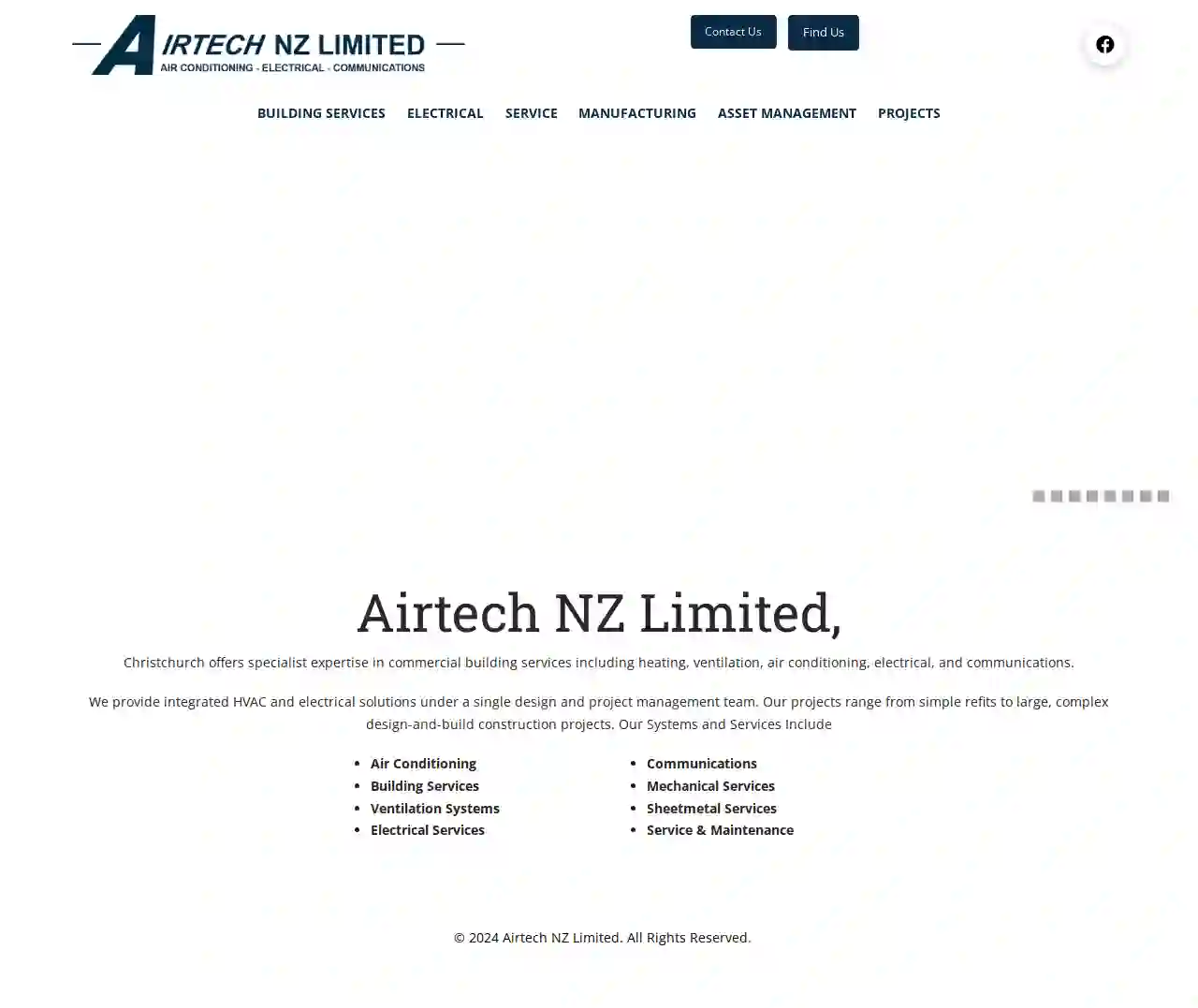
Airtech NZ Limited
3.56 reviews50 Disraeli Street, Christchurch, 8440, GBAirtech NZ Limited, based in Christchurch, provides specialist expertise in commercial building services, encompassing heating, ventilation, air conditioning, electrical, and communications. We offer integrated HVAC and electrical solutions under a single design and project management team. Our project portfolio spans from straightforward refits to large, intricate design-and-build construction projects. Our Systems and Services Include: * Air Conditioning * Building Services * Ventilation Systems * Electrical Services * Communications * Mechanical Services * Sheetmetal Services * Service & Maintenance We cater to commercial and industrial clients throughout New Zealand, designing, building, installing, and servicing heating, ventilation, and air conditioning systems. We also specialize in building automation, designing and supplying building control and automation systems for both new construction and building renovations. Our service plans are tailored to safeguard your investment and ensure your systems consistently operate as intended. Our comprehensive electrical services encompass systems design, installation, maintenance, and servicing of commercial buildings' electrical infrastructure.
- Services
- Why Us?
- Gallery
Get Quote
Southern Counties Air Conditioning & Refrigeration Ltd
55 reviews34 Vale Grove, Gosport, PO12 4PS, GBSouthern Counties Air Conditioning is a family-run business with over 20 years of experience providing a range of air conditioning services. We install, repair, service and maintain air conditioners from leading brands, offering competitive pricing and efficient work. Our team is available 24/7 for call outs and we serve both domestic and commercial properties of all sizes in Hampshire and Surrey.
- Services
- Why Us?
- Our Team
- Testimonials
- Gallery
Get Quote
Over 12,692+ HVAC Companies on our directory
Our HVAC companies operate in Shanklin & surrounding areas!
HVACCompaniesHub has curated and vetted Top HVAC Contractors in Shanklin. Find a trustworthy business today.
Frequently Asked Questions About HVAC Companies
- Experience: Choose a contractor with extensive experience in the HVAC industry, especially in the type of service you need.
- Licensing and Insurance: Verify that the contractor is properly licensed and insured.
- Certifications: Look for NATE (North American Technician Excellence) certification, which indicates a high level of technical competency.
- Reputation: Check online reviews and ratings to assess the contractor's reputation and customer satisfaction levels.
- References: Ask for references from past customers and contact them to inquire about their experience.
- Estimates and Quotes: Get written estimates or quotes from multiple contractors to compare pricing and services.
- Warranty Information: Ask about warranties on equipment and labor.
- Communication: Effective communication is key. Choose a contractor who responds promptly and clearly answers your questions.
- Experience and Expertise: Look for installers with experience and a good understanding of AC systems.
- Licensing and Insurance: Make sure the installer is licensed and insured to work in your area.
- Reputation and Reviews: Check online reviews and ratings from other customers.
- Detailed Quotes: Get itemized quotes outlining all costs associated with the installation.
- Warranties: Inquire about warranties on equipment and labor.
- References: Ask for and check references from past customers.
- Communication: Choose an installer who communicates clearly and promptly.
- Regular Air Filter Replacement: Change or clean your HVAC system’s air filters regularly (every 1-3 months).
- Professional Air Duct Cleaning: Have your air ducts cleaned by professionals every few years to eliminate dust, mold, and other contaminants.
- Improve Ventilation: Ensure adequate ventilation in your home to bring in fresh air and exhaust stale air. Use exhaust fans in kitchens and bathrooms.
- Control Humidity Levels: Use a humidifier or dehumidifier to maintain optimal humidity levels and prevent mold growth.
- Clean Regularly: Dust and vacuum frequently to minimize airborne particles.
- Avoid Smoking Indoors: Smoking indoors significantly reduces IAQ.
- Use Natural Cleaning Products: Opt for natural cleaning products that don’t release harmful VOCs (volatile organic compounds).
- Monitor Indoor Air Quality: Consider using an indoor air quality monitor to track pollutant levels.
How do I choose the right HVAC contractor?
What should I look for when hiring an AC installer?
How can I improve my home's indoor air quality?
What are the benefits of a programmable thermostat?
How do I choose the right HVAC contractor?
- Experience: Choose a contractor with extensive experience in the HVAC industry, especially in the type of service you need.
- Licensing and Insurance: Verify that the contractor is properly licensed and insured.
- Certifications: Look for NATE (North American Technician Excellence) certification, which indicates a high level of technical competency.
- Reputation: Check online reviews and ratings to assess the contractor's reputation and customer satisfaction levels.
- References: Ask for references from past customers and contact them to inquire about their experience.
- Estimates and Quotes: Get written estimates or quotes from multiple contractors to compare pricing and services.
- Warranty Information: Ask about warranties on equipment and labor.
- Communication: Effective communication is key. Choose a contractor who responds promptly and clearly answers your questions.
What should I look for when hiring an AC installer?
- Experience and Expertise: Look for installers with experience and a good understanding of AC systems.
- Licensing and Insurance: Make sure the installer is licensed and insured to work in your area.
- Reputation and Reviews: Check online reviews and ratings from other customers.
- Detailed Quotes: Get itemized quotes outlining all costs associated with the installation.
- Warranties: Inquire about warranties on equipment and labor.
- References: Ask for and check references from past customers.
- Communication: Choose an installer who communicates clearly and promptly.
How can I improve my home's indoor air quality?
- Regular Air Filter Replacement: Change or clean your HVAC system’s air filters regularly (every 1-3 months).
- Professional Air Duct Cleaning: Have your air ducts cleaned by professionals every few years to eliminate dust, mold, and other contaminants.
- Improve Ventilation: Ensure adequate ventilation in your home to bring in fresh air and exhaust stale air. Use exhaust fans in kitchens and bathrooms.
- Control Humidity Levels: Use a humidifier or dehumidifier to maintain optimal humidity levels and prevent mold growth.
- Clean Regularly: Dust and vacuum frequently to minimize airborne particles.
- Avoid Smoking Indoors: Smoking indoors significantly reduces IAQ.
- Use Natural Cleaning Products: Opt for natural cleaning products that don’t release harmful VOCs (volatile organic compounds).
- Monitor Indoor Air Quality: Consider using an indoor air quality monitor to track pollutant levels.